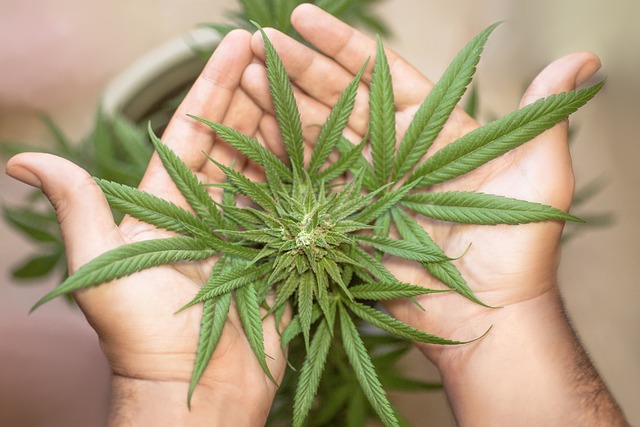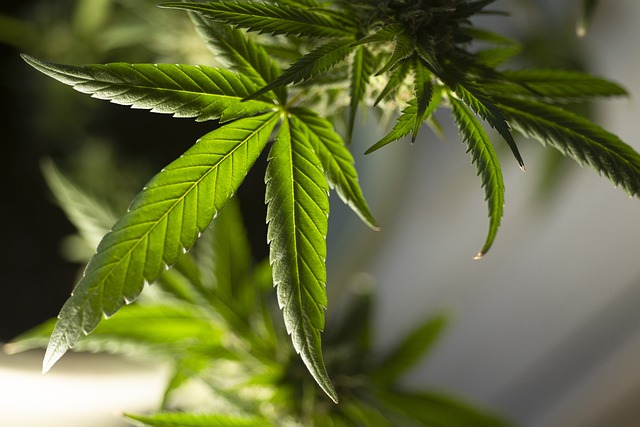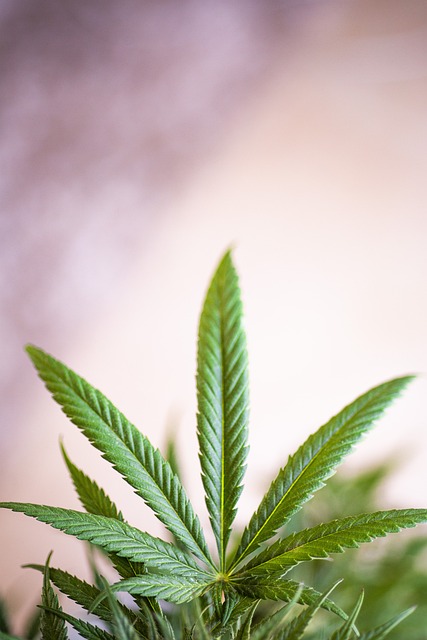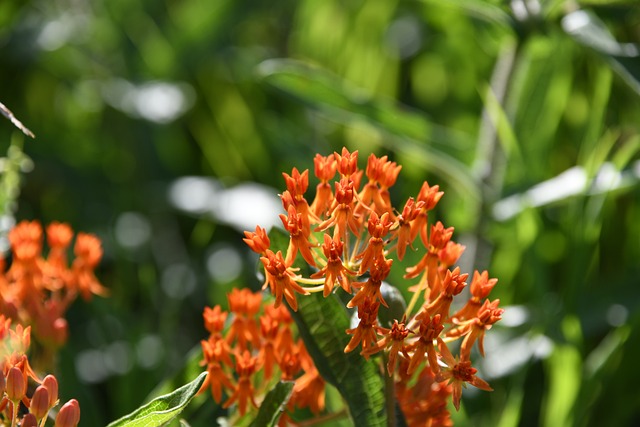Δ9-tetrahydrocannabinolic acid (THCA), a non-psychoactive compound found in cannabis plants, has gained attention for its potential health benefits and its distinct legal status in New Hampshire. Unlike THC, THCA does not induce psychoactive effects and is being investigated for anti-inflammatory, neuroprotective, and anti-nausea properties. In New Hampshire, THCA is legally recognized, allowing for the sale and consumption of products containing high levels of THCA within state laws. This legal distinction supports both consumer access to explore THCA's benefits and business innovation in the cannabis industry. The state's progressive stance reflects a commitment to medical research and public safety, positioning New Hampshire as a leader in cannabinoid legislation with a focus on THCA legality. As regulations evolve, staying informed is crucial for consumers and producers to navigate the legal landscape effectively.
Explore the intricate world of THCA flower, a non-psychoactive cannabinoid that’s garnering attention for its potential therapeutic benefits and legal status in New Hampshire. This comprehensive guide delves into the chemical structure of THCA, distinguishing it from CBD and THC, and unravels its place in history as it transitions from hemp to recognized medical use. With a focus on New Hampshire’s legislative landscape, we navigate the evolving legalities surrounding cannabinoids. As you journey through this article, you’ll discover cultivation tips for growing THCA-rich flowers, explore the psychoactive properties of THCA, and examine the latest medical research on its therapeutic potential. We’ll also provide insights on purchasing THCA flower legally, dosage guidelines, and safety considerations to ensure responsible use. The role of decarboxylation in unlocking THCA’s effects is demystified, along with guidance on storing the flower for maximum potency and freshness. As we look ahead, the future prospects of THCA research and its implications under both federal and state laws are discussed. This article aims to inform and educate about the role of THCA in the cannabis industry, including terpene profiles that influence its effects, ensuring you have a well-rounded understanding of this unique compound.
- Understanding THCA Flower and Its Legal Status in New Hampshire
- The Chemical Structure of THCA and Its Potential Benefits
- Historical Context: THCA's Evolution from Hemp to Medical Use
- New Hampshire's Legislative Landscape on Cannabinoids
Understanding THCA Flower and Its Legal Status in New Hampshire

THCA, or Tetrahydrocannabinolic Acid, is a non-psychoactive cannabinoid found in raw cannabis plants, including flowers. Unlike its well-known counterpart, THC (Tetrahydrocannabinol), THCA does not induce the high commonly associated with cannabis consumption. Instead, it exhibits potential therapeutic properties and is being studied for its benefits in managing pain, inflammation, and other health conditions. The interest in THCA flower has grown as individuals explore its potential wellness applications.
In New Hampshire, the legal status of THCA flower is subject to the state’s evolving cannabis laws. As per the 2021 Cannabis Regulation and Tax Act, New Hampshire permits the possession and home cultivation of cannabis for adults aged 21 and over. However, this legislation specifically legalized “cannabis” rather than all forms of cannabinoids explicitly. THCA flower, in its raw form, may fall into a gray area as it is a precursor to THC and has not been explicitly decriminalized or legalized for recreational use. It’s crucial for consumers to stay informed about the latest developments in state legislation, as the legal landscape for cannabis and its derivatives can change rapidly. Those interested in purchasing or using THCA flower should be aware of local laws and regulations to ensure compliance with New Hampshire’s cannabis policies.
The Chemical Structure of THCA and Its Potential Benefits

Delta-9-tetrahydrocannabinolic acid (THCA) is a non-psychoactive precursor to the well-known psychoactive cannabinoid, delta-9-tetrahydrocannabinol (THC). The chemical structure of THCA includes a pentyl ring system fused to an indole ring, which is characteristic of cannabinoids. This unique molecular configuration accounts for its interaction with the endocannabinoid system found in humans and animals. THCA’s potential benefits stem from its ability to interact with the body’s CB1 and CB2 receptors, influencing various physiological processes without the psychoactive effects associated with THC. Research has suggested that THCA may offer a range of therapeutic properties, including anti-inflammatory, neuroprotective, and anti-nausea effects.
As of my knowledge cutoff in 2023, THCA’s legal status varies by jurisdiction. In New Hampshire, THCA is legally distinguishable from THC due to its non-psychoactive nature. This distinction allows for products rich in THCA to be sold and consumed within the state’s regulatory framework, provided they comply with the state’s cannabis laws. The legality of THCA in New Hampshire opens up opportunities for consumers to explore its potential benefits, as well as for businesses to innovate and provide THCA-focused products, contributing to the burgeoning hemp and cannabis industries within the state. As regulations evolve, it is essential for both consumers and producers to stay informed about the legal landscape to ensure compliance with state and federal laws.
Historical Context: THCA's Evolution from Hemp to Medical Use

Delta-9-tetrahydrocannabinol (THC) has long been the most well-known compound in cannabis, but attention has recently shifted to its precursor, tetrahydrocannabinolic acid A (THCA). THCA is present in raw cannabis plants and is non-psychoactive, contrasting with its decarboxylated form, THC. The historical context of THCA’s evolution is deeply intertwined with the cannabis plant’s storied past. Historically used for a myriad of purposes, including industrial and medicinal, cannabis has been cultivated for thousands of years. In recent decades, scientific research has uncovered the unique properties of THCA, leading to its recognition as a potential therapeutic agent. This shift in focus has been mirrored by legislative changes, such as the legalization of hemp-derived products containing THCA, like those found compliant under the 2018 Farm Bill in states including New Hampshire, where THCA legal status aligns with these broader federal guidelines. The evolution from hemp to medical use reflects a growing body of research indicating that THCA may offer benefits for a range of conditions without the psychoactive effects associated with THC. This has opened new avenues for exploring cannabinoids’ therapeutic potential, particularly in areas such as pain management, inflammation reduction, and neuroprotection. As such, the scientific community continues to investigate the properties of THCA, with a particular interest in its medical applications and the potential for it to become a staple in holistic health practices.
New Hampshire's Legislative Landscape on Cannabinoids

In recent legislative developments, New Hampshire has carved out a distinct position concerning the use and legality of THCA, a non-psychoactive cannabinoid found in the cannabis plant. The state’s legislative landscape on cannabinoids has evolved to recognize the potential therapeutic benefits of THCA, leading to its legalization for medicinal purposes. This progressive stance allows patients with qualifying conditions to access THCA products that offer relief without the psychoactive effects associated with delta-9-tetrahydrocannabinol (THC), the main intoxicating compound in cannabis. The Granite State’s legislators have demonstrated a nuanced understanding of cannabinoids, recognizing the importance of different compounds for various therapeutic needs and the potential for THCA to play a role in this spectrum of medical treatments. As such, New Hampshire has established a regulatory framework that governs the production, distribution, and use of THCA within its medicinal program, ensuring accessibility while maintaining public safety. This legislative approach underscores a commitment to exploring the full potential of cannabinoids for health and wellness, positioning New Hampshire as a state attuned to the evolving conversation around cannabis and its derivatives.
In recent years, the discussion surrounding THCA flower has expanded significantly, particularly as its legal status in New Hampshire has been clarified. This article has delved into the intricate structure of THCA, highlighting its potential therapeutic properties and historical journey from hemp to recognized medical use. New Hampshire’s legislative approach to cannabinoids reflects a progressive stance, aligning with federal regulations that have evolved to support research and access to these compounds. As the understanding of THCA continues to advance, it is clear that its potential benefits are gaining recognition in the medical community. For those interested in exploring THCA legally within New Hampshire’s framework, this article provides a comprehensive overview, underscoring the importance of staying informed on the latest legislative developments in this dynamic field.
